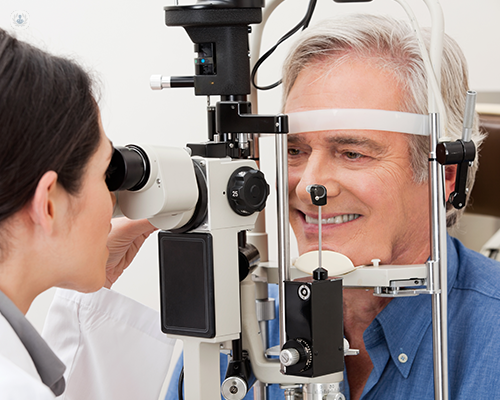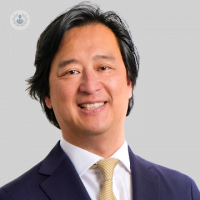Monitoring glaucoma
Autore:Glaucoma is an eye disease that gradually causes a loss of vision. In this article, Mr Kin Sheng Lim highlights the importance of monitoring glaucoma as well as explaining the tests that glaucoma patients can expect and discusses if all glaucoma patients will require surgery.

Why is monitoring glaucoma important?
Glaucoma is a disease which is generally asymptomatic and unless patients are monitored by a glaucoma specialist, they will not realise that their eye condition is getting worse. The condition worsens due to a loss of nerve fibres in the optic nerve as a result of pressure inside the eye.

It is also important to stress that once the vision damage has occurred from glaucoma, it is not reversible.
How quickly does glaucoma progress?
The type of progression depends on the type of glaucoma, the level of the intraocular pressure and the severity of glaucoma.
For example, some types of secondary glaucoma (caused by other conditions in the eyes) can have very high pressures which lead to a progression of glaucoma within weeks. Some patients with primary open-angle glaucoma, on the other hand, may only have a very slow progression of their condition that takes a few years.
However, it is important to remember that if you already have severe damage to your vision caused by glaucoma, a slight progression of your condition can have a devastating effect on your vision.
How are they monitored? With what tools?
In general, there are 6 tests/examinations which form the basis of monitoring patients with glaucoma.
Vision test
This is done using a standardised vision chart and although this test is not very sensitive in early glaucoma, it can be very useful in those with advanced glaucoma.

Intraocular pressure test
Intraocular pressure measurement is an essential part of glaucoma monitoring and should be done in every visit.
Gonioscopy examination
This is an important examination that happens when you first meet the glaucoma specialist. It looks at the channels where the aqueous fluid is drained out of the eye using a small mirror. If there are any suspicions about the changing nature of visibility of the channel, it may need to be repeated at most visits.
Optic nerve examination
An optic nerve carries sensory nerve impulses from your eye toward the visual centres in the brain. As damage to the optic nerve is often the first sign of glaucoma damage, this will form one of the most critical examinations of your eye by the glaucoma specialist during your monitoring visit. This examination is performed on the slit lamp with a special lens and without any contact on your eyes.
Visual fields test
The visual field test is a subjective measure of central and peripheral vision. It uses an automated machine to diagnose glaucoma, determine the severity of it and to monitor it. This test uses a light spot that is repeatedly presented in different areas of your vision and the test will last for a few minutes in each eye. After the initial diagnosis, the doctor will repeat the visual field test to check if the condition has worsened. This may be done every three to twelve months, depending on the severity and the stability of your glaucoma.
OCT scan of nerve thickness
Optical coherence tomography (OCT) is a test that uses a camera-type device to scan the eye. The device used does not touch the eye and the scan will obtain a topographical map of the optic nerve by using light waves to take cross-section pictures of the retina. It also measures the thickness of the nerve fibre layer, which is the portion of the optic nerve that is most vulnerable to eye pressure elevation. This is a useful test to monitor the progression of glaucoma and may be repeated every 6 to 12 months.
How often should patients with glaucoma have eyes checked?
The frequency of tests for monitoring glaucoma will depend on;
- The severity of glaucoma
- The type of glaucoma
- The stability of the condition
In general, patients with stable and early primary open-angle glaucoma will only need to be reviewed every 6 to 12 months, whilst those with severe and unstable secondary glaucoma may need to be reviewed every few weeks.
It is worth pointing out that if you have advanced glaucoma, a minimal progression may lead to significant permanent visual impairment and therefore it is imperative that patients with advanced glaucoma are monitored much more regularly.
Will all patients eventually need surgery?
Overall, about 20% of patients with glaucoma will require surgery in their lifetime. It is usually offered to patients if the glaucoma is still worsening despite trying non-invasive treatments. However, if you presented to the glaucoma specialist with advanced or secondary glaucoma, the chance of you needing surgery will be much higher. This does not include non-invasive treatments such as SLT laser, which most patients with primary open-angle glaucoma will likely to have at some point.
It is important to point out that there are many types of surgeries for glaucoma and some are more invasive than others. The exact type of glaucoma surgery will be determined by your glaucoma specialist, depending on the severity and the type of glaucoma that you have.
Mr Kin Sheng Lim is a leading specialist in the treatment of glaucoma. Visit his profile to learn more and to get in touch.


